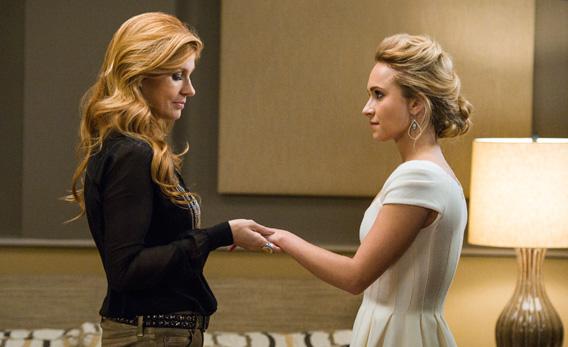In last week’s American Horror Story TV Club, Bryan Lowder presented an absolutely brilliant “grand unified theory” of AHS that is basically built around how anxiety-provoking it is to sit through AHS. At some point here in the Nashville TV Club I’m going to have to unveil my Grand Unified Theory of Nashville. I hope to postpone that moment as long as possible. The fact is, I’m not so sure Nashville needs a theory. In fact, it may be the kind of show that doesn’t even deserve one.
Are the characters richly developed? Sure, in the sense that they’re sympathetic and get good lines of dialogue and are very fun to watch. Are they realistic, as if someone has peeled back the curtain on the actual Nashville music scene? Slate’s Jody Rosen says they’re not far off, although it’s hard to imagine anything quite this sudsy or hammy happening on NBC, to say nothing of IRL. But who cares? I find myself coming around to Slate senior editor Dan Kois’ epiphany that sometimes you just want to look at pretty people singing. (And if not singing, brawling and pouting and pining like the Mississippi River was going dry.)
In the interests of procrastination, here’s a meta-theory about television show theories: They exist to rationalize viewing unpleasantness. I had a thousand theories about Dexter because I found his serial killing disturbing but was unwilling to stop watching the program. Homeland can be deeply uncomfortable to watch and so gave rise to fevered speculation about its moral ambivalence, attitudes about torture or mental illness, political leanings, etc.
Nashville, on the other hand, may just be a fun-lovin’ country opera with beautiful leads, first-class villains, juicy rivalries, and music where the philosophy should be. In fact, the most complicated moments in the show so far seem to either introduce or resolve themselves in song. Rayna and Deacon express their continued feelings for each other in a duet at the Bluebird Café. Scarlett and Gunnar’s songwriting is a barometer of their relationship. When Deacon works with Juliette on a single, they become more intimate than when she lures him into bed. Letting the complex and indeterminate experience of hearing music—especially country music with its overlapping ply of major and minor, strength and vulnerability, joy and pain—substitute for more explicit theme-weaving strikes me, actually, as fairly innovative. It reminds me that “watching pretty people sing” can be a pretty layered experience, and a show that can deliver it well delivers not discomfort but comfort to its audience. Hey, that sounds like a theory.
